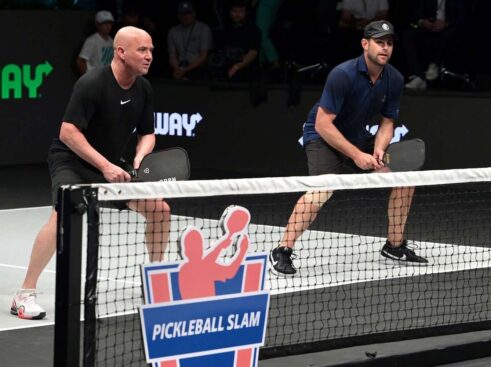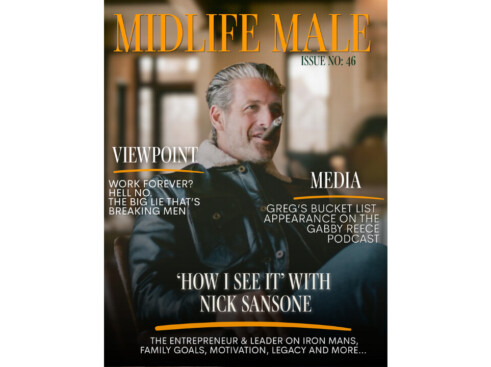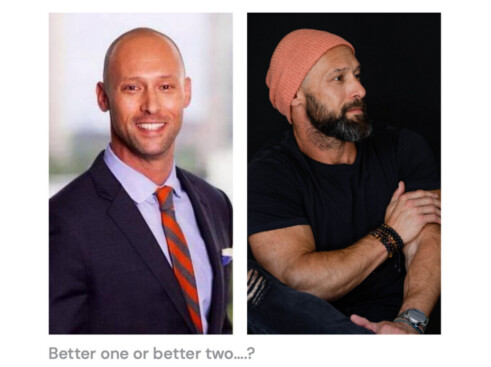Dr. Garth Davis is a practicing bariatric surgeon at Houston Methodist in Houston, Texas. He founded the Davis Program at Memorial Hermann, and starred on the hit TLC show Big Medicine. He is certified by the American Board of Surgery and is a fellow of the American College of Surgeons and a fellow of the American Society for Metabolic and Bariatric Surgery.
Davis also competes in marathons and Ironman triathlons and is the author of Proteinaholic: How Our Obsession With Meat Is Killing Us and What We Can Do About It. MLM Founder Greg Scheinman sat down with Dr. Davis to discuss his path to becoming a surgeon, parental expectations, our broken healthcare and food systems, training for IronMans and putting family first.
Please enjoy this week’s How I See It with Dr. Garth Davis.
How I See It
Greg Scheinman: What motivated you to start focusing on health and self-improvement?
Dr. Garth Davis: There’s the short answer: I’m studying health and the science behind it. But really, it’s a longer story that goes back to how I got into writing and speaking about these topics.
For years, I just followed the path laid out for me—go to school, finish high school, go to college, medical school, residency, and then become a doctor. I became a weight loss surgeon, not because I was particularly interested in weight loss, but because it was something I excelled at as a surgeon. My focus was always on fixing diseases, like a plumber fixing pipes.
But then I hit a turning point. By the time I was 35, I was overweight and feeling sick, and it didn’t sit right with me that I was telling others how to lose weight while struggling with my own health. I decided to get a life insurance policy and was shocked when the results came back: high cholesterol, hypertension, fatty liver. I couldn’t even qualify for the top-tier policy. That really threw me for a loop, especially since I knew my family’s health history. It made me pause and think—am I heading in the same direction as my patients? It was the wake-up call that pushed me to start questioning everything.
Greg Scheinman: How did this realization change your perspective on health?
Dr. Garth Davis: It completely shifted how I approached medicine. I started asking why we get sick in the first place. In Western medicine, we’re trained to treat diseases, but I began wondering why these diseases even exist. Are our bodies inherently flawed, or are we just not treating them right? That led me down the path of exploring what the healthiest people around the world do differently. That got me thinking about how I could improve my own health and that of my patients.
Greg Scheinman: You mentioned you were always going to medical school. Was that a family influence?
Dr. Garth Davis: Absolutely. My father was a doctor, and it was just kind of a given in my family. It’s like the classic story—you grow up hearing, “You’re going to be a doctor.” I even remember getting knocked out during a high school football game, and when I came to, I was asking, “Am I still going to be a doctor?” It was ingrained in me from a young age. I went to the University of Texas and even majored in philosophy, but that was only because I knew medicine was my end goal.
Greg Scheinman: How did you choose surgery, and later, weight loss surgery as your focus?
Dr. Garth Davis: My father was a surgeon, and I really admired that. Surgery had this appeal of being very concrete—something’s broken, you go in and fix it. There’s a certain machismo to it, this high-stakes, high-pressure environment. That drew me in. I started out in general surgery, and right around the time I was finishing my residency, weight loss surgery was starting to gain popularity. No one was doing it well in Houston, so the Chairman of Surgery at Baylor asked me to pursue it, and that’s how I ended up specializing in it.
Greg Scheinman: Has your focus shifted since then?
Dr. Garth Davis: Absolutely. My initial focus was very technical—cutting stomachs, doing rearrangements—but over time, I started to realize that we were missing the bigger picture. I’ve become passionate about nutrition and understanding how deeply connected it is to overall health. There’s a quote by Wendell Berry that I live by now:
“The problem with the world is that we have a healthcare system that doesn’t care about food, and a food system that doesn’t care about health.”
That pretty much sums up everything I’m fighting against today.
Greg Scheinman: How do you balance this massive goal to change people’s lives with your own health and happiness. What makes you happy, and how has that changed over time?
Dr. Garth Davis: That’s an interesting question because I don’t think I ever used to consider happiness, or whether I was happy. I didn’t ask myself those questions. My focus was just on being a doctor and doing my job. But I see this is common, particularly in men our age—we don’t often reflect on what happiness means to us.
Eventually, I started asking myself: Does happiness come from being in the operating room all the time? No. But does it come from never being in the operating room? Also, no. I realized that part of happiness involves change, staying pliable, and not getting stuck in a routine, no matter how much you like it. Family is also a huge part of my happiness—seeing my kids grow, giving them new experiences, like being outdoors more. That makes me happy. And for myself, I realized I don’t want to run on pavement or bike in loops around the city. I want to run in forests and bike in mountains.
Greg Scheinman: It sounds like you’ve reflected a lot on how happiness ties into both your work and personal life. Can you share more about what led to that shift?
Dr. Garth Davis: Definitely. I had a friend who made a big career decision that got me thinking. He was a top triathlete and up for a big partnership at V&E, which was a major achievement professionally. But he realized that taking that role would make him unhappy because he wouldn’t be able to continue being a triathlete. So he chose a different job that allowed him to keep doing what he loved. That struck a chord with me because I always thought happiness equaled professional success. But as I’ve gotten older, I’ve learned that’s not the case.
Greg Scheinman: It seems like your view on success and happiness has evolved a lot. How do you measure work and personal fulfillment now?
Dr. Garth Davis: It’s a constant balance. As you mentioned, it’s like a pie chart, and the percentages shift. For me, success used to be all about work, and I was missing out on other parts of my life. But now, I see that I need a balance between professional goals and personal happiness. It’s like you said, we have to weigh these decisions. If I want to train for a decathlon or spend time with someone like you, does it come at the cost of business? Sure, sometimes. But if I focus solely on work and neglect what makes me happy, it won’t be good for anyone, including my family.
Greg Scheinman: Speaking of family, how does that play into your happiness?
Dr. Garth Davis: Family is a big part of it. As fathers, we often feel like our own happiness doesn’t matter, that it’s all about our kids and our family. I’ve struggled with that, especially when I was training for Ironman. I missed a lot of time with my youngest during that period. I don’t have as many memories with her because I was always training. And that hurts. But I’ve realized that if I’m not happy, it affects my family. So being happy for myself is also important for them. If I’m miserable, they feel it too.
Greg Scheinman: It sounds like finding which version of that pie chart works for you at any given time is tough. How do you approach it now?
Dr. Garth Davis: I’ve had to be really intentional about balance. I still need to work out after work; it’s important for my own happiness. But now I limit it to 30-45 minutes instead of the two-hour sessions I used to do. I’m not going to do another Ironman, and my wife didn’t forbid me—I chose that myself. I want to be there for my kids. I can’t miss out on their lives again.
Greg Scheinman: How does this decision affect your relationships, especially with your family?
Dr. Garth Davis: It’s hard. I look at pictures of my youngest, and it kills me that I wasn’t around as much. My wife reminds me that I was always out training, and that’s why I missed putting her to bed. I don’t regret doing the Ironman, but it does hurt that I missed those moments. Going forward, I don’t think I could miss out on their lives like that again, even for something as big as another Ironman. Maybe when they’re older and don’t want me around as much, I’ll consider it, but for now, my priorities have shifted.


